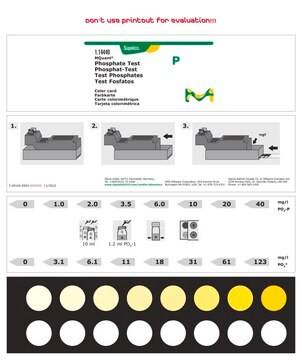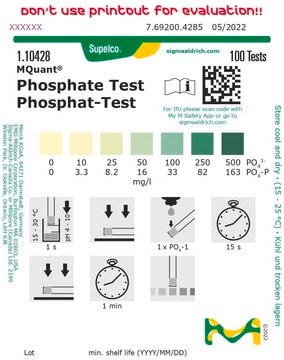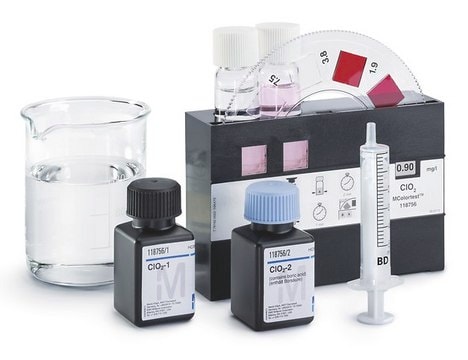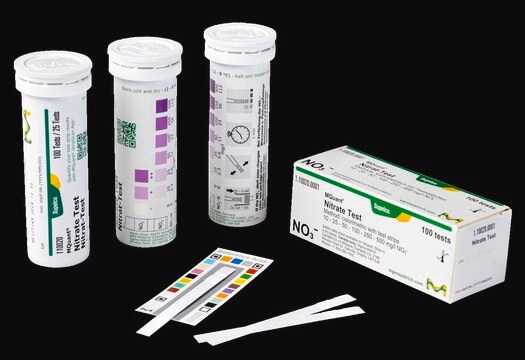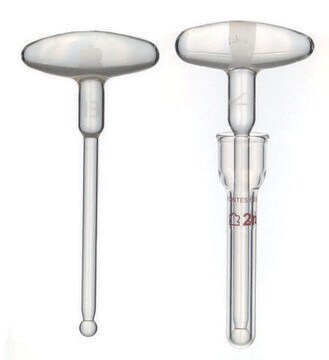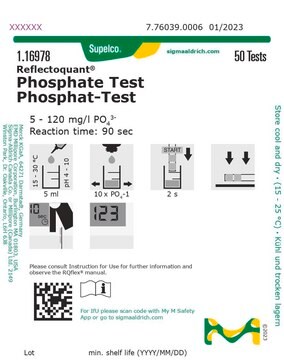1.18394
Phosphate Test Kit, colorimetric
0.015-0.14 mg/L (PO₄-P), 0.046-0.43 mg/L (PO₄³⁻), MQuant®
Synonyme(s) :
Phosphate Visual Test Kit
About This Item
Produits recommandés
Nom du produit
Phosphate Test, colorimetric, 0.015-0.14 mg/L (PO4-P), 0.046-0.43 mg/L (PO43-), for use with MCOLORTEST®
Analyte(s) spécifique(s)
phosphate
Niveau de qualité
Plage de mesure
0.015-0.14 mg/L (PO4-P)
0.046-0.43 mg/L (PO43-)
Compatibilité
for use with MCOLORTEST®
Méthode de détection
colorimetric
Température de stockage
15-25°C
Description générale
- Groundwater and surface water, seawater
- Drinking water
- Wastewater
- Soils and fertilizers after appropriate sample pretreatment
- Food after appropriate sample pretreatment
- Steels after appropriate sample pretreatment
Method
In sulfuric solution orthophosphate ions react with molybdate ions to form molybdophosphoric acid. Ascorbic acid reduces this to phosphomolybdenum blue (PMB). The phosphate concentration is measured semiquantitatively by visual comparison of the color of the measurement solution with the color fields of a color card. The unique brilliance of the print and their fine color graduation allow precise analyses, even at the lower end of the concentration range.
Due to the long test tubes a sensitive measurement range can be covered.
Using the refill pack 1.18465 containing all the reagents, the original test kit can be used for a very long time, making it a particularly economical and ecological system.
Application
- Environmental Monitoring: Phosphate tests are extensively used in environmental monitoring to assess the levels of phosphate in water bodies. These tests help in evaluating the impact of agricultural runoff, industrial discharge, and wastewater treatment on water quality. Recent studies have focused on using selective colorimetric nano-sensing solutions to determine phosphate ions in drinking water samples, highlighting their importance in ensuring safe and clean water supplies (Salem and Draz, International Journal of Environmental Analytical Chemistry, 2020).
Informations légales
Mention d'avertissement
Danger
Mentions de danger
Classification des risques
Eye Dam. 1 - Met. Corr. 1 - Skin Corr. 1A
Code de la classe de stockage
8A - Combustible, corrosive hazardous materials
Classe de danger pour l'eau (WGK)
WGK 1
Certificats d'analyse (COA)
Recherchez un Certificats d'analyse (COA) en saisissant le numéro de lot du produit. Les numéros de lot figurent sur l'étiquette du produit après les mots "Lot" ou "Batch".
Déjà en possession de ce produit ?
Retrouvez la documentation relative aux produits que vous avez récemment achetés dans la Bibliothèque de documents.
Notre équipe de scientifiques dispose d'une expérience dans tous les secteurs de la recherche, notamment en sciences de la vie, science des matériaux, synthèse chimique, chromatographie, analyse et dans de nombreux autres domaines..
Contacter notre Service technique